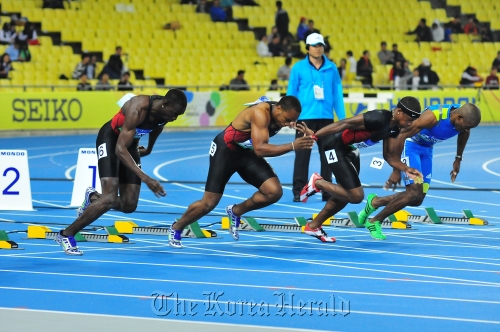IAAF to disqualify athletes after just one false start
Usain Bolt, the fastest man in the world, is undoubtedly the hot favorite to win the 100-meter race in Daegu on Sunday. But the Jamaican could be disqualified if he makes just one false start, according to new rules introduced by the sports governing body.
Under the new false start rule implemented by the International Association of Athletics Federations, one false start will see an athlete disqualified at the Daegu World Championship, which kicks off on Saturday for a nine-day run.
 |
Sprinters leave the start line during the Daegu Pre-Championship in May. (Daegu Organizing Committee) |
At the previous World Championships in Berlin 2009, an athlete needed to false start twice to be disqualified from a race, but in 2010 the governing body adopted a zero-tolerance policy against false starts.
The IAAF believes a human can react no faster than 0.1 second, and its rules state that if one moves within 0.1 second after the gun has fired, the athlete will be immediately disqualified from the race.
And there is a good chance sprinters, including Bolt, may fall victim to this rule in the upcoming championship.
If Bolt is disqualified it will be a huge upset for fans, but observers believe the impact would be minor to Bolt, as one of, perhaps the only, weakness of the Jamaican sprinter is his start reaction.
Bolt had a reaction time of 0.146 sec, the fourth fastest time among the eight runners in 2009, when he won the 100m title in Berlin with a world record of 9.58.
Apart from the false star rule, the IAAF will also take strong measures to root out doping at the championships.
The governing body has pledged to collect blood samples from all athletes taking part in the Daegu World Championships with the support of the World Anti-Doping Agency and a number of local partners, including the Daegu Local Organizing Committee, the Korean Anti-Doping Agency and the Doping Center of the Korea Institute of Science and Technology.
It is the first time that a large population of more than 2,400 elite athletes competing in a major sports event will be blood tested within the same time period. The samples are already starting to be collected at a doping control station located in the athletes’ village, according to the organizer.
By Oh Kyu-wook (
596story@heraldcorp.com)






![[Exclusive] Hyundai Mobis eyes closer ties with BYD](http://res.heraldm.com/phpwas/restmb_idxmake.php?idx=644&simg=/content/image/2024/11/25/20241125050044_0.jpg)
![[Herald Interview] 'Trump will use tariffs as first line of defense for American manufacturing'](http://res.heraldm.com/phpwas/restmb_idxmake.php?idx=644&simg=/content/image/2024/11/26/20241126050017_0.jpg)
![[Herald Review] 'Gangnam B-Side' combines social realism with masterful suspense, performance](http://res.heraldm.com/phpwas/restmb_idxmake.php?idx=644&simg=/content/image/2024/11/25/20241125050072_0.jpg)